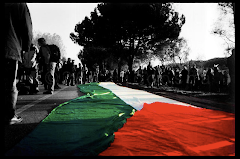'Tungsten bombs' leave Israel's victims with mystery wounds
By Raymond Whitaker
Israel was facing demands for war crimes investigations as it declared a unilateral ceasefire in Gaza last night after a 22-day assault in which more than 1,200 Palestinians, a third of them children, were killed and 13 Israelis died.
Two children were killed yesterday when Israeli tanks shelled a UN school in which families were sheltering, leading a UN spokesman, Chris Gunness, to say: "There has to be an investigation to determine whether a war crime has been committed." The call was dismissed by an Israeli foreign ministry spokesman, Yigal Palmor, who said: "These claims of war crimes are not supported by the slightest piece of evidence." But among numerous allegations of disproportionate use of force, questions are also multiplying about the use of unconventional weapons by Israel, including a new type of bomb that causes injuries that doctors have not seen before, and which they find impossible to treat.
The Israeli Prime Minister, Ehud Olmert, claimed in a televised address last night that the military operation had "fully attained" its goals, "and beyond". Israel had declared the ceasefire in response to an appeal from the Egyptian President, Hosni Mubarak, but troops would remain for now in Gaza, and Hamas would be "surprised again" if it attacked.
But even though Mr Olmert said Hamas had been "beaten badly", rockets landed in Israel a few minutes before he spoke. Despite the desperate state of Gaza's population, Hamas leaders said they would continue to fight for an end to Israel's closure of crossing points into the territory and a withdrawal of the Israeli forces.
Mr Mubarak invited the Palestinian President, Mahmoud Abbas, and the French President, Nicolas Sarkozy, to discuss Gaza in Sharm el-Sheikh today. The UN Secretary-General, Ban Ki-moon, said he might attend, and Gordon Brown is among other leaders due to take part.
Although Mr Olmert's announcement was only a first step towards halting the conflict in Gaza, the UN is not the only international body insisting that inquiries must be held as soon as possible into the tactics and weapons used by Israel. Erik Fosse, a Norwegian doctor who worked in Gaza's hospitals during the conflict, said that Israel was using so-called Dime (dense inert metal explosive) bombs designed to produce an intense explosion in a small space. The bombs are packed with tungsten powder, which has the effect of shrapnel but often dissolves in human tissue, making it difficult to discover the cause of injuries.
Dr Fosse said he had seen a number of patients with extensive injuries to their lower bodies. "It was as if they had stepped on a mine, but there was no shrapnel in the wounds," he said. "Some had lost their legs. It looked as though they had been sliced off. I have been to war zones for 30 years, but I have never seen such injuries before." However, the injuries matched photographs and descriptions in medical literature of the effects of Dime bombs.
"All the patients I saw had been hit by bombs fired from unmanned drones," said Dr Fosse, head of the Norwegian Aid Committee. "The bomb hit the ground near them and exploded." His colleague, Mads Gilbert, accused Israel of using the territory as a testing ground for a new, "extremely nasty" type of explosive. "This is a new generation of small explosive that detonates with extreme power and dissipates its power within a range of five to 10 metres," he said.
According to military databases, Dime bombs are intended for use where conventional weapons might kill or injure bystanders – to kill combatants in a house, for example, without harming people next door. Instead of being made from metal, which sprays shrapnel across a wide area, the casing is carbon fibre. Part of the motive for developing the bombs was to replace the use of depleted uranium, but Dr Fosse said the cancer risk from tungsten powde was well known. "These patients should be followed up to see if there are any carcinogenic effects," he said.
While the loudest controversy has been over accusations that white phosphorus was illegally used, other foreign doctors working in Gaza have reported injuries they cannot explain. Professor Mohammed Sayed Khalifa, a cardiac consultant from Sudan, said that two of his patients had had uncontrollable bleeding. "One had a chest operation, and continued bleeding even after having been given large quantities of plasma," he said. "The other had what seemed to be a minor leg injury, but collapsed with profuse bleeding. Something was interfering with the clotting process. I have never seen such a thing before."
Dr Ahmed Almi, an Egyptian cardio-thoracic consultant at al-Nasser hospital in Khan Younis in southern Gaza, said he had seen a number of patients with inexplicable injuries. A boy of 14 had a small puncture wound in his head, but extensive damage to his brain, making it impossible to save his life. "I don't know the nature or type of these weapons that make a very small [entry wound] and go on and make massive destruction in the tissues," he said.
Israeli military representatives have refused to confirm or deny using specific weapons, but insist that all Israel's weapons comply with international law. Neither white phosphorus nor Dime bombs are illegal, but campaigners say the way they have been used, especially in Gaza's densely packed urban areas, could constitute a war crime.










No comments:
Post a Comment